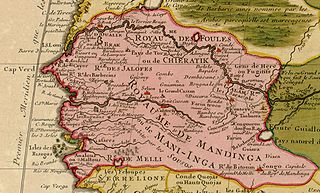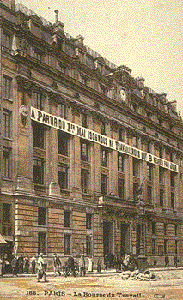Related Research Articles

The history of Senegal is commonly divided into a number of periods, encompassing the prehistoric era, the precolonial period, colonialism, and the contemporary era.

The General Confederation of Labour is a national trade union center, founded in 1895 in the city of Limoges. It is the first of the five major French confederations of trade unions.

The Union syndicale Solidaires, Solidaires or Solidaires Unitaires Démocratiques (SUD) is a French group of trade unions.

The Bourse du Travail, a French form of the labour council, were working class organizations that encouraged mutual aid, education, and self-organization amongst their members in the late nineteenth and early twentieth centuries.
Iba Der Thiam, also known as I. D. Thiam, was a Senegalese writer, historian, and politician. He served in the government of Senegal as Minister of Education from 1983 to 1988; later, he was First Vice-President of the National Assembly of Senegal from 2001 to 2012.
Union Sénégalaise des Travailleurs was a trade union federation in Senegal formed in 1962. The founders of UST included members of the erstwhile 'orthodox' faction of UGTAN. The UST was however divided. In October 1964, one wing of UST merged into UNTS. The following month, the remainder of UST founded the Confederation sénégalaise du travail (CST).
The Congress of Democratic Trade Unions is a national trade union centre in Quebec formed on 8 June 1972 in response to a split within the Confederation of National Trade Unions Confédération des syndicats nationaux, CSN). It is the smallest of the four labour centres in Quebec, with about 4% of the union membership in the province.
Confédération générale du travail du Burkina is a revolutionary national trade union centre in Burkina Faso. Bassolma Bazié the general secretary of CGT-B.
The Confédération générale des travailleurs africains was a trade union centre in French West Africa, in existence from 1956 to 1957.
Trade unions in Guinea were historically important - having played a pivotal role in the country's independence movement - and in recent years have again assumed a leading role.
Joseph Ouédraogo was a Burkinabè trade unionist and politician, active during the last years of the French Upper Volta and subsequently in the Republic of Upper Volta.
Jean-Paul Hétu was a Quebec trade unionist.

Women in Senegal have a traditional social status as shaped by local custom and religion. According to 2005 survey, the female genital mutilation prevalence rate stands at 28% of all women in Senegal aged between 15 and 49.
Confédération africaine des syndicats libres, initially 'Confédération africaine des syndicats libres-Force ouvrière, was an Africa confederation of trade unions. CASL-FO was founded in February 1958 as the African sections of the French trade union centre CGT-Force Ouvrière separated themselves from their mother organization. The new union confederation was founded at a conference in Abidjan February 8–9, 1958, with participation of the CGT-FO branches of Senegal, French Soudan, Upper Volta, Niger, Ivory Coast, Cameroon, Moyen-Congo and Ubangui-Shari. At the time of the founding of CASL-FO, the relationship of the new structure with the International Confederation of Free Trade Unions (ICFTU) and CGT-FO, was debated. In the end the conference resolved that CASL-FO and CGT-FO should have membership of ICFTU on equal footing.
The General Union of Negro African Workers, more widely known by its French name Union générale des travailleurs d'Afrique noire, was a pan-African trade union organization. Ahmed Sékou Touré was the main leader of the organization. In its heyday, around 90% of the trade unions in Francophone West Africa were affiliated to UGTAN.
The Confédération africaine des travailleurs croyants was a trade union confederation in French West Africa and Togo. C.A.T.C-A.O.F-Togo was founded in Ouagadougou July 8–15, 1956 by the West African branches of the French trade union centre C.F.T.C. David Soumah became the first president of C.A.T.C-A.O.F-Togo.

Paul Delesalle was a French anarchist and syndicalist who was prominent in the trade union movement. He started work as a machinist, became a journalist, and later became a bookseller, publisher and writer.

Jacques Julliard was a French historian, columnist and essayist, and a union leader. He was the author of numerous books.
Eugénie Beeckmans was a trade unionist and women's rights advocate. In 1913, she was appointed to the Conseil supérieur de l'enseignement technique for the French Republic. She was one of the delegates to the Inter-Allied Women's Conference, a parallel congress to the 1919 Paris Peace Conference and participated in the 18 March presentation to the Labour Commission of the Peace Conference regarding working conditions faced by women labourers. She served as the inaugural president of the Fédération des Syndicats professionnels du Vêtement of the Confédération Française des Travailleurs Chrétiens (CFTC) from its founding in 1921 until 1937. In 1921, she represented the Syndicat de l’Abbaye at the Second CFTC Congress. She was elected as a member of the Confederal Bureau of the General Confederation of Labour in 1921 and re-elected in 1925, and from 1922 to 1924 served on their national council. In 1923, together with Maria Bardot, she successfully negotiated the first collective labour agreement for female garment workers, providing a basis for better wages and for expanding union membership. In the period between the two world wars, as an influential member of the CFTC, she is considered to be among the most striking representatives of women's Christian militarism in France.
References
- ↑ "Statistics on union membership". Geneva: International Labour Organisation. Retrieved 20 October 2019.
- ↑ SENEGAL, The State of Social Dialogue: Report of Trade Union participation in Senegal’s Poverty Reduction Strategy Paper: The World Bank.
- ↑ SENEGAL, The State of Social Dialogue: Report of Trade Union participation in Senegal’s Poverty Reduction Strategy Paper: The World Bank.
- Beyond the numbers game. Peter Hall-Jones, New Unionism 2007 Union Federation Membership Numbers Survey.
- 2007 Annual Survey of violations of trade union rights: Senegal, TUC-CSI-IGB
- Guy Pfeffermann. Trade Unions and Politics in French West Africa during the Fourth Republic. African Affairs, Vol. 66, No. 264 (Jul., 1967), pp. 213–230. Guy Pfeffermann is Founder & CEO of Global Business School Network
- 11. Senegal: Institutional Aspects of Trade and Industry Policy. Gaye Daffé and Momar Coumba Diop, in THE POLITICS OF TRADE AND INDUSTRIAL POLICY IN AFRICA: Forced Consensus? Edited by Charles Soludo, Osita Ogbu, and Ha-Joon Chang. Africa World Press/IDRC 2004 ISBN 1-59221-165-8
- Internationally-recognised Core Labour Standards in Niger and Senegal: REPORT FOR THE WTO GENERAL COUNCIL REVIEW OF THE TRADE POLICIES OF NIGER AND SENEGAL (Geneva, 22-24 September 2003), International Confederation of Free Trade Unions.
- Senegal: Annual Survey of Violations of Trade Union Rights (2006), International Confederation of Free Trade Unions.
- Portions of this article were translated from French Wikipedia's fr:syndicalisme au Sénégal. (2008-06-13)
Further reading
- (in French) Nicole Bernard-Duquenet, « Les débuts du syndicalisme au Sénégal au temps du Front populaire », Le Mouvement social, n° 101, octobre-décembre 1977, p. 37-59
- (in French) Ibrahima Camara, Syndicalisme, colonialisme et impérialisme au Sénégal, 1972
- (in French) Adrien Dioh, Les syndicats de travailleurs au Sénégal, Paris ; Budapest ; Torino, L'Harmattan, 2002, 400 p. ISBN 2-7475-2291-1
- (in French) Mar Fall, L'État et la question syndicale au Sénégal, Paris, L'Harmattan, 1989, 127 p.
- (in French) Omar Guèye, Le mouvement syndical au Sénégal pendant la deuxième guerre mondiale, Dakar, Université Cheikh Anta Diop, 1991, 43 p. (Mémoire de DEA)
- (in French) Magatte Lô, Sénégal : syndicalisme et participation responsible, L'Harmattan, 1987
- (in French) F. Mulot, « Syndicalisme et politique au Sénégal », Revue française d'études politiques africaines, 158, 1979, p. 63-90
- (in French) Birame Ndour, Éléments d'études sur le mouvement ouvrier dans les chemins de fer du Sénégal (1882–1938), Paris, Université de Paris VII, 1981, 67 p. (Diplôme d'Etudes Approfondies)
- (in French) E. H. I. Niang, Le rôle du syndicalisme dans le développement économique : le cas du Sénégal, Université Laval, 1987 (M.A.)
- (in French) Luis C. Nunes, La Participation du syndicalisme à la construction nationale en Afrique : examples du Sénégal, Mali et Côte d'Ivoire, Genève, Ed. Médecine et Hygiène, 1972
- (in French) Jean-Pierre Phan, Syndicalisme et mouvement de libération nationale au Sénégal jusqu'à l'indépendance, 1976
- (in French) Christian Roche, Le Sénégal à la conquête de son indépendance, 1939-1960. Chronique de la vie politique et syndicale, de l'Empire français à l'Indépendance, Paris, Karthala, 2001, 286 p.
- (in French) Ousmane Kéba Sane, Le mouvement syndical enseignant au Sénégal : Du syndicat unique de l'enseignement laïc (S.U.E.L) au syndicat des enseignants du Sénégal (S.E.S), Dakar, Université Cheikh Anta Diop, 2002, 143 p. (Mémoire de Maîtrise)
- (in French) Djibril Alassane Sarr, L’UNTS : histoire d'une centrale syndicale (1962–1971), Dakar, Université de Dakar, 1986, 106 p. (Mémoire de Maîtrise)
- (in French) Ahmat Hadji Sidimi, Le mouvement ouvrier dans le chemin de fer 1917-1925. Genèse, évolution, Dakar, Université de Dakar, 1983, 126 p. + 4 p. (Mémoire de Maîtrise)
- (in French) Iba Der Thiam, L’évolution politique et syndicale du Sénégal colonial de 1840 à 1936, Paris, Université de Paris I, 1983, 9 vol., 5 179 p. (Thèse d'État)
- (in French) Adrien Dioh, Les syndicats de travailleurs au Sénégal, Paris ; Budapest ; Torino : L'Harmattan, 2002, 400 p. ISBN 2-7475-2291-1
